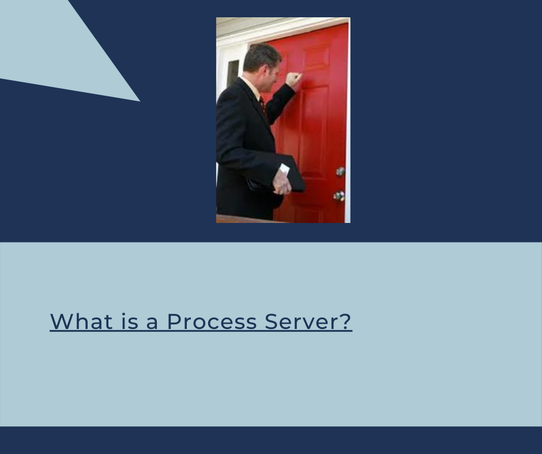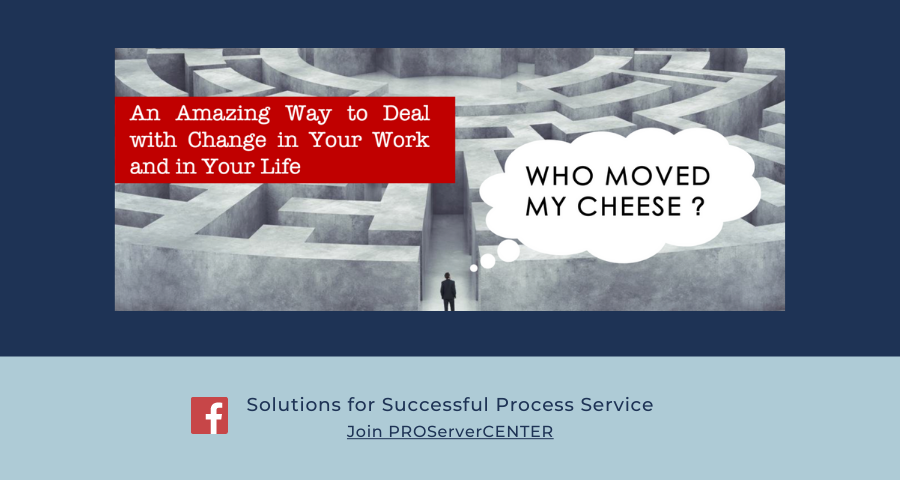|
Author: Richard Farrell, is the driving force behind our mission to help process servers achieve consistent quality in service of process. His extensive experience in training and education development brings a modern approach to finding practical solutions to the process service industry.
According to a U.S. bank study, more than eight out of 10 new businesses fail because of poor cash-flow management. Don’t let your new business fall prey to that likelihood. From bookkeeping strategies to financing options, here’s what you need to know to set your process service business up for success. Understand Cash Flows. Cash flow is the lifeblood of any business, including process serving. In essence, cash flow is any money coming in or going out of your business’s hands during a certain time period. Money coming in is known as positive cash flow; money going out, negative cash flow. Obviously, the goal of any process serving business is to have more positive than negative cash flow. For many process servers who are just getting started, the early stages of operation may be defined by lots of negative cash flow, as you make investments in equipment, inventory or marketing all the while trying to build your customer base. The risk in not understanding your cash flow — and, consequently, why so many new businesses fail — is running into a situation where you have more money going out, whether to pay rent, utilities, other process servers or so on, than you have coming in, on hand or access to by other means, such as via bank overdraft protection or a short-term small business loan. Particularly for businesses that experience a lot of seasonality, and process serving definitely has its ups and downs in volume, understanding how your cash flow varies throughout the year will help your process service business make the most of the strong-sales months and better able to weather the weak-sales periods. Just another reason you’ll stand to benefit from meticulous bookkeeping. Keep the Books. Getting a firm grasp on all aspects of your process serving business’ cash flow is critical to its ongoing success for a myriad of reasons, and you should establish an airtight method for logging money coming in versus money going out. Having your process service business key numbers at your fingertips will be helpful for all manner of business matters, including keeping track of unpaid payments, scheduling expenditures, cutting wasteful spending, identifying your most profitable services or routes, helping secure investments or business loans, and many other important tasks. Keeping the books, or accounting, is simply the process of recording all the financial transactions pertaining to your process serving business, and you’ll need to decide whether you’re up to the task or would benefit from a professional’s assistance. The number one problem shared among entrepreneurs today is finding, vetting, hiring, and retaining expertise. For many small- to mid-size process serving companies, a cloud-based accounting service like QuickBooks is a cost-effective service that makes bookkeeping easy. As your process service business grows, you may want to consult with a certified accountant in addition to using a cloud-based accounting service. QuickBooks’ software allows you to track your process serving business' sales, invoices, bill payments, employees’ wages, other process server payments, loan repayments and so much more. And, because they’re part of the Intuit suite of software products, you can easily roll relevant numbers over to another one of their products, TurboTax, come tax time. But QuickBooks isn’t the only option, and other bookkeeping software services may be a better fit for your process serving business. Some of other options include:
Don’t Forget about Taxes. Does using an accounting software service eliminate the need for a professional accountant for your process serving business? Definitely not, especially if you have a unique or complex tax situation. While your accounting software may integrate nicely with tax-prep software and having all your process serving business figures documented and in one place will surely expedite preparing your taxes, tax codes change frequently and only a certified CPA can advise you on the most advantageous filing. Plus, going through a CPA limits your liability. Speaking of taxes, what kind of taxes should you be prepared to pay as a process server? As a small process serving business owner, your business is likely categorized as a Sole Proprietorship, Partnership (Limited and Limited Liability), Limited Liability Corporation (LLC) or S-Corporation. All of those categories are considered “pass-through entities” for federal tax purposes and must pay an income tax for the owner’s personal income tax rate. If you’re expecting to owe more than $1,000 in income tax in a year, then you should pay these as estimated taxes according to the IRS’s timetable in order to avoid penalties and interest. Additionally, if you have employees, you’ll be responsible for employment taxes, which includes Social Security and Medicare taxes, Federal Unemployment Tax (FUTA), and their income tax. While technically that last one is paid by employees and withheld from their wages, you’re the one who needs to see that it gets to the U.S. government. Know Your Financing Options as a Last Resort. At some point you may need to inject outside cash into your process serving business, whether to cover a short-term cash flow problem or to invest for future growth. We advise you do that only as a last resort! At that point, it’s good to know the range of financing options available. Here are the most common types of financing for small businesses including process service:
Taking charge of your process serving business’ finances shouldn’t be a headache, and it should be about a whole lot more than just keeping the lights on. With the financial data at your fingertips, you should feel empowered to make strategic decisions for long-term business success. Hire Expert Process Servers Exactly When You Need Them! Source: Entrepreneur
Author: Richard Farrell, program administrator with extensive experience in training and education development at the PROServer CENTER, a legal professional organization whose mission is to set a national standard for the process service industry in the United States.
It’s no secret that small businesses like process service play a vital role in the US economy. However, revenue for process serving businesses can be scarce. For instance, small businesses that do not have any employees average just $44,000 a year in annual revenue with two-thirds of these companies earning less than $25,000 per year. While various factors can affect a business revenue potential, one of the most important factors is the pricing strategy that its process serving business owners utilize. Whether you're just starting out in process service or you’re ready to begin advertising to drive sales, now is the time to learn what role pricing plays in the bigger picture. Once you have a firm understanding of what a pricing strategy is, you can start reviewing the various approaches and choose the best one for your process serving business.
What is a pricing strategy and why is it important to process servers?
In short, a pricing strategy refers to all of the various methods that small businesses use to price their goods or services. It’s an all-encompassing term that can account for things like:
Pricing strategies are useful for numerous reasons, though those reasons can vary from one process service business to another. Choosing the right price for your process service business will allow you to maximize profit margins if that’s what you want to do. Contrary to popular belief, pricing strategies aren’t always about profit margins. For instance, you may opt to set the cost of a process service at a low price to maintain your hold on market share and prevent other process serving competitors from encroaching on your territory. In these cases, you may be willing to sacrifice profit margins in order to focus on your process serving business competitive pricing. But you must be careful when engaging in an action like this. Although it could be useful for your business, it also could end up crippling your process service company. A good rule of thumb to remember when pricing services is that your clients won’t purchase service of process if you price it too high, but your process serving business won’t be able to cover expenses if you price it too low. Here are 10 different pricing strategies for your small process serving business to consider: As we’ve just identified, project management and strategic, actionable decisions go into setting the price of a your process service. Here are ten different pricing strategies that you should consider as a small process serving business owner.
1. Pricing for market penetration
As a small business owner, you’re likely looking for ways to enter the process serving market so that your services become more well-known. Penetration strategies aim to attract clients, like attorneys, paralegals and law firms by offering lower prices on services than other process servers. For instance, imagine a process server sells a service for $100. You decide to sell the product for $97, even if it means you’re going to take a loss on the sale. Penetration pricing strategies draw attention away from other process serving businesses and can help increase brand awareness and loyalty, which can then lead to long-term contracts. Penetration pricing can also be risky because it can result in an initial loss of income for your process serving business. Over time, however, the increase in awareness can drive profits and help small process service businesses stand out from other process servers. In the long run, after penetrating a market, process serving business owners can increase prices to better reflect the state of the service’s position within the market.
2. Economy pricing
This pricing strategy is a “no-frills” approach that involves minimizing marketing and operational expenses as much as possible. Used by a wide range of businesses, including process servers, economy pricing aims to attract the most price-conscious clients. Because of the lower cost of expenses, process serving companies can set a lower sales price and still turn a slight profit. While economy pricing is incredibly useful for large companies, the technique can be dangerous for small process serving businesses. Because small businesses lack the sales volume of larger companies, they may find it challenging to cut operational costs. Additionally, as a young process serving company, they may not have enough brand awareness to forgo custom branding.
3. Pricing at a premium
With premium pricing, process serving businesses set costs higher because they have a unique service or brand that no one can compete with. You should consider using this strategy if you have a considerable competitive advantage over other process servers and know that you can charge a higher price without being undercut. Because clients need to perceive services as being worth the higher price tag, a process serving business has to work hard to create a perception of value. Along with providing a high-quality service of process, process server business owners should ensure that the consistency of the high value over time, the professionalism and reliability associated with their process service all combine to support the premium price. An example of premium pricing is a PROServer List member who has differentiated himself from other process servers by obtaining the designation of a Certified Process Server and by joining this exclusive group of process servers who all maintain the highest quality of professionalism in the process serving industry.
4. Price skimming
Designed to help businesses maximize sales on new services, price skimming involves setting rates high during the initial phase of a service. The company then lowers prices gradually as competitor services appear on the market. An example of this is seen when a process server is initially the only provider of process service in a certain local area. Once another process server joins the same local market, the process serving business owner gradually lowers his service fees in order to prevent being driven out of the area. One of the benefits of price skimming is that it allows process serving businesses to maximize profits on early adopters before dropping prices to attract more price-sensitive clients. Not only does price skimming help a small business recoup its development costs, it also creates an illusion of quality and exclusivity when you first introduce your service and your process serving business to the marketplace.
5. Psychological pricing
Psychological pricing refers to techniques that marketers use to encourage clients to respond based on emotional impulses, rather than logical ones. For example, setting the price of a process service at $199 is proven to attract more lawyers and paralegals than setting it at $200, even though the actual difference here is quite small. One explanation for this trend is that clients tend to put more attention on the first number on a price tag than the last. The goal of psychology pricing is to increase demand by creating an illusion of enhanced value for your process serving business clients.
6. Bundle pricing
With bundle pricing, small process serving businesses offer multiple services for a lower rate than clients would face if they purchased each item individually. A useful example of this occurs when a process server offers service of process, legal documents filing and skip tracing. When marketing each of these services individually, the price may be higher than if combined as a group. For example, a process serving business may set their fee for process service at $50, filing of paperwork at $75 and skip tracing at $40. At the same time the business may offer a bundle of filing and service at $110 or skip tracing and process service at $70 in order to attract more clients to their process serving business. Not only is bundling services an effective way to increase sales, it can also increase the value perception in the eyes of your clients. Paralegals and attorneys feel as though they’re receiving more bang for their buck. Small process serving business owners should keep in mind that the profits they earn on the higher-value items must make up for the losses they take on the lower-value services.
7. Geographical pricing
If you expand your process serving business across state or national lines, you’ll need to consider geographical pricing. Geographical pricing involves setting a price point based on the location where it’s sold. Another factor in geographical pricing could be basic supply and demand. For instance, imagine you offer service of process in an area where you are the only process server. In this case you may choose to set a higher price point than in another area where you have competition from other process servers.
8. Promotional pricing
Promotional pricing involves offering discounts on a particular service. For instance, you can provide your process service clients with vouchers or coupons that entitle them to a certain percentage off another service, like filing of an affidavit with the court or locating an individual who has moved. Promotional pricing campaigns can be short-term efforts. For instance, you may run a promotional pricing strategy over an extended holiday, like Memorial Day Weekend. By offering these deals as short-term offers, process serving business owners can generate buzz and excitement about a service. Promotional pricing also incentivizes clients to act now before it’s too late. This pricing strategy plays to a client’s fear of missing out.
9. Value pricing
If you notice that sales are declining because of external factors, you may want to consider a value pricing strategy. Value pricing occurs when external factors, like a sharp increase in competition or a recession, force the small process serving business to provide value to its clients in order to maintain sales. This pricing strategy works because clients feel as though they are receiving an excellent “value” for the service of process. The approach recognizes that clients don’t care how much a service costs a company to perform, so long as the client feels they’re getting an excellent value by purchasing it. This pricing strategy could cut into the bottom line, but process serving businesses may find it beneficial to receive “some” profit rather than no profit.
10. Keep track of business revenues
Once you determine the right pricing strategy for your process serving business, your profit margins could increase. You’ll want to make sure you’re using reliable accounting software to keep track of relevant data. Such software makes it easy for you to monitor relevant sales data and manage cash flow in one place. This data allows you to continually evaluate your pricing method so that you can make price changes in real-time, grow your process serving business, and improve your client success.
Author: The Process Server Center | PROServerCENTER is a legal professional organization whose mission is to set a national standard for the process service industry in the United States.
Highlight: Non-services do not have to ruin your process server's reputation. Learn what's the difference between a complete and incomplete process service. Service of process is the method employed by the parties in a lawsuit to formally deliver the legal documents on the other parties and the court. It is an essential step in commencing a civil lawsuit. In fact, service of process is so essential in a lawsuit that, if it is not performed properly, a lawsuit cannot proceed. Service of process is critical because it establishes that the court hearing the lawsuit has jurisdiction over the defendant. Jurisdiction is a court’s ability to hear a controversy involving two or more parties. A court has jurisdiction because these parties have some connection to the court, whether it is because they are citizens of the state where the court sits or because the state in which the courts sits is the site of the plaintiff's claim. Service of process is also important because it notifies the defendant that the plaintiff is bringing a lawsuit and that the courts will hear the impending lawsuit. There are strict rules about how to serve different kinds of documents. These rules vary by federal, state, county and town courts. They also vary by the type of legal documents a process server has to deliver. It is very important to understand how to properly serve documents to the opposing party (or their lawyer if represented). Not doing it correctly can make your case grind to a halt. You may learn how to differentiate between different courts and types of documents by enrolling in the Process Server Center's Training Program for process servers. It is clear that for a court to obtain jurisdiction to hear a case, the parties must be properly served. Based on that, for the purpose of the court and your client, a complete process service is a service that has resulted in the successful delivery of the legal documents to the person being served. Any other outcome regardless of the reason behind it, does not allow the court to proceed with the lawsuit. Hence, why attorneys and paralegals are unhappy when a process server does not complete the service and instead returns an affidavit of non service. It is important for process servers to understand the difference between a complete and incomplete service of process and how to perform thorough due diligence in order to help their clients move forward with the case. Outcomes in Process Service
Process serving begins every time a process server is hired by an attorney or paralegal to deliver legal documents. As described above, the result of this delivery is crucial to your clients and the court in order for the lawsuit to continue. There are 2 main outcomes when serving process:
Complete Process Service
A complete process service is the successful delivery of legal documents to the person or business entity being served. For service of process to be deemed sufficient and complete, it has to be served exactly as prescribed by the originating court following the exact rules and regulations governing the lawsuit. The service of process must be done within the timeframes allowed by the court and an affidavit of service must be filed again exactly as defined by the court in this particular case.
Incomplete Process Service
An incomplete process service is any service that results in the failure to deliver the legal documents to the person or entity being served. The reasons for the incomplete process service may vary depending on the circumstances but some common reasons are:
Regardless of the reason, every incomplete process service delays the lawsuit, increases the legal expenses and causes frustration to your client. The best process servers understand what incomplete service of process really means to their clients. They act proactively in order to minimize the percentage of incomplete services and prove that thorough due diligence has been completed for each and every service. After all, the best process servers know that even though it may not be their fault, incomplete process service is greatly frowned upon by their clients. They also know that happy clients lead to more clients and ultimately to what most process servers want - to grow their process serving business! In order to minimize the number of non-services you send back to your clients, process servers may use these 8 tips for proper process service:
Many services may not be possible to complete due to factors beyond a process server's control. However, executing thorough due diligence with each attempt and fully recording/documenting all attempts made, would ultimately prove to your clients and the court that you have performed your duties as a process server, even when a service ends up as an incomplete. Being proactive and including a full write up of your evidence in your non-service affidavit would convince your client of the quality of your services. Some of the suggestions here require extra work and incur additional expenses. However, after you advise your client of the findings in the field, you may offer additional tools to help them locate, find and ultimate serve the defendant. Accurate and timely process of service is a critical part of every legal proceeding, since most future legal action cannot be taken until documents are delivered to all involved parties. Hiring a process server with PROServer List is usually the most efficient way of ensuring legal documents are received by their intended recipients and your service of process is complete as prescribed by the rules of the originating court.
Question Answered by Maggie, the Process Server Helper | PROServerCENTER is a legal professional organization whose mission is to set a national standard for the process service industry in the United States.

Maggie, the process server helper, answers: "Rich people come from all types of industries and it is possible to get rich even in process service. What’s more, you do not need to be brilliant. You do not have to be a workaholic. You do not need to have some unique talent if you want to get rich, either. Here's the secret most process servers don't know: Getting rich is about how you live your life and run your business, and what you do with the money you make!"
The Process Server Center loves to help process servers with questions they may have in order to succeed in their business. We recently received a question from one of our community groups and we turned to Maggie to find out the answer. Here is what we talked about:
PROServer Center: "So what do you think, Maggie, can a process server get rich from process serving? You know, start off small, as a single process server, serving all documents yourself, and then grow enough where you become the boss and generate enough to make a good profit?"
Maggie: "Let's try and answer this question here. First of all, let's take into consideration the fact that our own perception defines what "Rich" means. One process server may consider making a profit of $3,000 per month to be rich. Yet another may need a lot more to even break even. There are different paths one can take in order to build his/her process service business. Depending on the path we choose, the goals and outcomes would vary. "
PROServer Center: "Well, Maggie, I know that being rich is mostly a feeling that depends on how much you want or think you need to feel rich. Let's set some parameters here and talk about what a process server can do if they are just starting out or have been serving for some time as the only process server in their business... How do they go from that start point to a point, let's say, where they now hire other process servers to work under them on a regular basis... And perhaps where this process server no longer needs to physically serve papers, but rather manages the business and grows it even more?"
Maggie: "A wise man once said: 'Show me how you run your business, and I will let you know if you run it for a long time...' Getting rich in process serving is about how you run your business. It is about, first of all, who you are, what your needs are, and what your goals are. Understanding these well helps you understand the resources you have and the results you want to achieve. Let's now try and help our community readers with 7 steps process servers can take to get rich and move themselves from being a solo process server to a process serving business with several servers that runs smooth and has the potential to grow... well, and in the process, make its owner get rich!"
1. Get Prepared
Maggie: "The first step will be, of course, to get well prepared. Process servers can get rich mostly by adopting good behaviors and money habits in their businesses and personal lives. They have financial discipline. They manage their money well. And that’s something any process server can learn to do. Before you embark on the endeavor to get rich as a process server, make sure you are well prepared and trained to serve legal documents yourself. Many of the rich people out there have started off from the very bottom in their now large corporations. And part of the reason for their success is that they know the ins and outs and every little detail in between in their businesses. As a new or solo process server, take the time to learn. Invest in your knowledge: take online training classes, work for other agencies, pay attention to the little details, see what others are doing well and what others are not doing so well, learn how other process servers do it in the field and how they are efficient about it. Don't forget to include business and organizational skills as part of your training as process serving is as much about delivering legal documents as it is about being organized and managing your business well. And if you want to get rich as a process server, you have to do it better than others!"
2. Gather Experience Under Your Belt
Maggie: "While getting your online training, put yourself out there and work for others or for a handful of clients. Don't think a job is too small for you. Take each and every one and don't fear diversity. There are many rules and regulations in process serving based on type of court, federal, state, county, town level, then based on type of legal action. There are many things to learn and as easy as process serving seems, it can quickly get pretty confusing. While getting experience under your belt, pay attention to the details and intricacies of each process and create strict procedures that your business must implement at each step of serving legal documents: receiving the paperwork, creating the record, getting the documents ready for service, making attempts, preparing the affidavits and getting paid. Each step in this process has its own challenges, so be sure to fully understand them and seek ways to perfect each step. The more you know and understand about process serving as a type of business, the higher the chance for success."
3. Market Yourself Carefully
Maggie: "When you are new as a process server, very few clients know you even exist. Growing your business takes consistent efforts to do your work better than others and to network. Don't market yourself without a plan. Instead set yourself some goals, craft a few marketing ideas and implement for a period of time. Then compare what works and what doesn't, and make a new plan. Growing a process service business takes time, of course, and being consistent in your networking is important if you want to see a positive outcome. Consider joining NAPPS, provided you have the required years of experience to be eligible for membership; they are the nationwide association and it matters to be one of many other process servers. Maybe also consider joining Serve-now, but consider they are an internet directory and the fact they recently were acquired by an Australian company?! If you are already experienced as a process server and want to stand out as one of the best in your area, join PROServer list. It is the exclusive place for top notch process servers, but it is not for everyone, rather reserved for the best of process servers."
4. Take Care of Each and Every Client
Maggie: "Oh yes! No exceptions! Take care of each attorney, paralegal, pro se client, as if they are your one and only client. It definitely pays off! Unfortunately I see so many of you spending time and money to market themselves, only to see you fail because you cannot organize yourself to take care of your clients. It is actually pretty easy to grow your process service business if you are the new kid on the block. The common talk among legal clients is how frustrated they are with unreliable process servers. So they are constantly on the lookout for the next process server. Once you get their attention, make sure you take care of them better, faster, with more diligence than the previous process server. The happier your client is, the higher the chance they will recommend you to others. Do you see what's happening? One, two, three, more... your satisfied clients will start hearing about you and you are suddenly on your way to get rich while doing process serving."
5. SAVE SAVE SAVE
Maggie: "While you're doing all of the above, do not use/waste, etc all of your profits, no matter how small. Make sure to start putting money aside until you have at least 6 months, preferably 1 year, of savings that you can live off yourself. Why that matters? Remember you wanted to get rich and be the boss and hire others? Well, when time comes to take this step, it is important that you focus on the growth, on managing your process servers, overseeing and training them. You need to be free of 'How do I pay my own bills?' worries, in order to build and grow your process serving business. During this growth time, in addition to managing, hiring, training people to work under you, you will continue to make sure that each client is taken care of 100%, no exceptions. Many servers fail during this stage as they continue to serve papers themselves, they lose focus and do not manage their business which should be there primary goal at this growth stage..."
6. Run a Tight Ship
Maggie: "In a small business, inefficient operating processes cost money in hidden ways. Sloppiness bleeds profits. Rich small business owners run a tight ship.
Be hands on as process service business owner. Inspect the little things. Broken equipment, lax schedules, incorrect affidavits, insufficient due diligence — all lead to a general air of carelessness that soon spreads like it is contagious. The flip side is, paying attention to details can transform your process serving business into a lean, mean, profit-generating machine. Details mean the difference between:
7. Get More Clients
Maggie: "While growing and training your process servers, be frugal and continue to save more of your profit margins for... no, not for a rainy day. Continue to save in order to get rich! Once your servers are trained and doing well to perform with minimum supervision, get more clients. It is time to get rich! You are well prepared, well organized and well run as a process serving business. It is time to look for large clients with high volume to help you get rich while doing process serving! Start with your local large law firms. Show them your knowledge and past experience. Let current clients talk about you. If you are a PROServer List member, ask to be featured in the monthly process server publication "In Focus" that features the best process servers in the country. While continuing to grow, continue to manage your business every day, while looking for inefficient processes. Eliminate problems, perfect each process, show your clients they can trust that every service of process will be done on time and without any hassle for them. Just to mention... that's when the time comes for you to raise your fees to reflect the highest level of professionalism with which you operate your process serving business."
PROServer Center: "I see now that growth in process serving requires perseverance and diligently following the steps to build and grow your one-man business to a solid one with several process servers. Maggie, what would you say as an encouragement to our readers who are eager to get on the path to becoming rich from process serving?"
Maggie: "Nothing ventured, nothing gained. Be prepared to take risks if you want to get rich as a process server. But, walk into it with eyes open and protect the downside by managing the risks carefully.
Dream and visualize... It would help you stay motivated when it gets tough!"
PROServer Center: "Thank you, Maggie! We will share your tips with our process servers."
Maggie: "You are welcome! Don't forget to Ask me Anything about process service!"
Author: The Process Server Center | PROServerCENTER is a legal professional organization whose mission is to set a national standard for the process service industry in the United States.
"I lost 80% of my process service clients...", John is telling us his story in a phone call. "I drive around every day, leaving cards at law firm offices, wasting gas and all, and then nothing, absolutely nothing! I don't hear back from them! What am I doing wrong?" Frantic calls like this one are an almost daily routine at the Process Server Center. There are many process servers like John who have lost a large percentage of their process service clients and they all need help. We tell John that he is not doing anything wrong. But there is a huge difference between not doing anything wrong and not doing the right thing to help your process service business, particularly during hard times.
Process servers belong to the service providers industry that has been hit particularly hard by the current pandemic. According to a survey by the National Federation of Independent Businesses, conducted in August 2020, 21% of business owners say they will permanently shut down if the economy does not improve within the next six months.
As a process service professional, you servers need to acquire multiple revenue streams to weaken the financial risk, given today’s economy. It is also critical to operate with the right mindset about one’s work. You are the absolute proprietor of your own labor, and particularly during these hard times, it is important that you see yourself as the owner of your own professional process service firm. Your name, reputation and brand are inseparably tied to your process service quality and professionalism. As the CEO of Process Server, Inc., the following are four quick, yet effective ways process servers may use in order to acquire new clients: 1. Connect to a hidden job market Many process servers regularly mail out, email or drop off business cards and brochures to paralegals, attorneys and other legal professional. Unfortunately, this marketing approach rarely works. Process servers who randomly send introduction letters are at a huge disadvantage. Small and particularly large law firms are also going through the current difficult times, many working remotely or with limited resources. Lawyers and paralegals struggle to find time to review the cards and brochures process servers send them, and instead opt to merely discard the majority of the all-too-popular time-wasters in a digital (or literal) trash can. A better approach for process servers is to tap into undisclosed opportunities by instead speaking with social-media contacts, business associates, friends, family members and people who are already in your existing personal and professional circles. Networking is a powerful tool for finding new business opportunities or expanding your current process service customers. In addition to law firms who do not have a process server and are actively searching for one, the majority of process servers clients actually come from customers who are not satisfied with the quality their current process servers provide. Unlike the open and active customers who sometimes even advertise openings for process servers, the hidden ones represent a much larger approach in acquiring a new process server. In fact, a LinkedIn poll from the end of 2020 found that unposted or hidden opportunities represent 75% of all new service industry opportunities. Leveraging this hidden market through networking makes it more likely you will find new customers for your process service business.
2. Touch base with past clients
If you are like most small process service businesses, the bulk of your revenue comes from a few clients while the rest only provide infrequent work or one-off projects. The 80/20 rule says that 80% of the effects (i.e., revenue) come from 20% of causes (customers). Because of this, there is a natural temptation among process servers to ignore past clients who did not previously provide consistent cash flow. However, times and circumstances change. Remember, decision-makers are also routinely replaced and hidden opportunities to grow your process service business are abundant if you know how to hustle for them. There is a popular saying in marketing that goes like this: “The money is in the list.” That is an email list. Do some digging in your inbox or process server software and create a mailing list that allows you to touch base with former clients and associates. Remind them of who you are and what services you offer. It only takes one or two resurrected accounts — in addition to current clients, of course — to create a new pipeline of work that will keep you busy year-round. When reaching out, personalize your email and show what you have done for similar clients in the past. Focus on what differentiates you from other local process servers: consistency in quality, excellent turn around time, additional education, industry designations like PROServer. Since former customers have paid you once, assuming they had a positive experience, they will be more likely to pay you for your services again. Slowly but surely, some of your past clients will come back or remember your process service business when an associate asks them for a referral.
3. Fight for strategic accounts
As a process server, it is a good idea to separate regular clients from potential high-value clients, like large law firms, government agencies and nationwide process service management companies. High-value targets are ones that make you very profitable, have a large volume of process service and if they are the right one, then they are also easy to work with. In contrast, struggling process service solopreneurs work with low-margin accounts which often supply more in the way of migraines than actual revenue. Bad customers imprison service professionals in a cycle of service-to-service dependency, as they are unable to devote enough time to landing more lucrative accounts.
4. Stay connected with decision-makers In many cases, it is a matter of timing. You may have a shot at landing a lucrative large law firm client but just not right now. Paralegals with whom you have built a relationship routinely go on maternity (or paternity) leave or vacations, attend weddings or come down with an untimely illness — any number of things, really. By constantly networking with decision-makers, you can be first in line when decision makers change. A hidden opportunity to grab this new large process service client may just be around the corner. With social media, connecting with decision-makers is more convenient than ever. As a process server, it is never a bad idea to become well-acquainted with popular networking sites like LinkedIn or Facebook, which allow users to connect with high-value prospects, as well as join relevant industry groups like the exclusive PROServer List. LinkedIn is the top choice of social media platform for legal professionals of all sizes, large or small. Join LinkedIn as a process server and also join process server groups, like the PROServer Center. Or join process servers Facebook community groups, like PROServer Center. But don't just join and browse and waste your valuable time as a process server solopreneur. Make your voice be heard, be an active participant and provide regular value. The more fellow entrepreneurs, paralegals, lawyers, managers within your industry view your profile and the expertise you readily share as a process server, the greater the chance you will be considered as their preferred process server. And isn't that the ultimate goal of most process servers, all of whom are chasing a limited number of clients. Yes, putting in the effort to be top-of-mind can seem daunting, but not everything you do has to have an immediate return. Being predominant with legal industry decision-makers can lead to securing a contract or landing that large new law firm as a client when a business or online acquaintance is suddenly in need of the process service you offer, even if your relationship may not seem very strong at the time. Will each of the above methods immediately lead to a constant influx of new, exciting work for all process servers? If that is your expectation, prepare for a letdown. What is more likely to happen, instead, is that one or two of the people you have networked with will at least give you a shot and choose you as their preferred process server. From there, it is your job to keep your new client satisfied. Really satisfied! Fortunately, your growing process service business bank balance will be proof of the right, targeted effort! Become the Go-To Process Server in Your Local Area
Author: Brani Andreev, MBA, is an expert in nationwide management of process service, consultant, speaker, and developer of the breakthrough Management Model of the 4Ps™ that ensures the consistent quality of process service.
Is it possible to start a process service business with no money? It is not easy, but for certain type of businesses like process service, the answer is yes, and here is how it is done.
Process service is one of these service businesses where in most cases, you spend money only when you make money. What it means is that if you have organized your business frugally (you have not rented an outside office and have not hired an office assistant before you have even served one process), then you spend money only when a client hires you to deliver legal documents. The "secret" to launching your process service business with little or no money is to get creative and be determined. Contrary to the cliché, it does not always "take money to make money." There are plenty of process service business owners who started their businesses with little or no cash. Here are 11 strategies that work to start a process service business without capital: 1. Recognize and Use the Assets You Have as a Process Server If you are reading this article, chances are you have little or no cash to invest in a business. But you do have assets and abilities that you can use to get a process service business started. Most likely you already have skills and knowledge that would help you launch your process service business. Perhaps you are a retired law enforcement officer, a former military, have worked as a courier or even a delivery guy. Many skills you have developed while working other jobs could be applied and used as assets when starting your process service business. Using those skills and assets - in other words, using what you already have – is the key to getting your process service business started when you have little or no money. Begin by making a list of things you already know how to do, are good at doing and like doing that are related to process service. Do not limit this initial list. List even the simplest tasks like delivering pizza or mail, as well as more difficult or skilled things like analyzing financial data or creating software. Next, think about the physical things and money you do have that could be used in your process service business. For instance, if you are reading this page on a computer or a mobile device that you own, you already have a piece of equipment that you can use to get your process service business started. You can use your word processor (or other software if you have it) to keep track of your services or prepare affidavits of service or even write up promotional materials and distribute them by email to paralegals or attorneys who want information about your services. If you have an inkjet or laser printer, you can print some of your initial promotional materials in very small quantities. Once you know what works and want to print, say 100 copies, it may be cheaper to have a local UPS or Staples or an online printer run them off for you. Your smartphone can be used to create snapshots or videos to publicize your process service business to people you know on Instagram or other social media platforms. And if you own a reliable vehicle, then you already have one of the most important physical assets to launch your process service business, particularly if you do not live in a metropolitan area with regular and reliable public transportation. 2. Make Money by Saving Time While Launching Your Process Service Startup To increase your chances of success with your business, consider getting proper process server training through online or in-person programs. Your investment in such programs ensures that you have the right skills and knowledge to serve legal documents in the most efficient way and cut time spent per service. Why do things the hard way, particularly if you have little or no money to invest in your process service business? Wasting time while attempting to serve a respondent or getting affidavits ready translates into wasting money. The better equipped you are, the more efficient you become and the more money you will make as a process server. Learning and acquiring process service know-how teaches you to pay attention and minimize spending. It also helps you keep business costs down once you get your process service business going. 3. Work as a Process Server from Home Many process servers complain that they are struggling to make ends meet, even though they have clients and they regularly serve legal documents. While the reasons behind this could be many, one key expense may be pulling you down and preventing you from seeing that profit. Renting office or retail space for your process service business is expensive and most times unnecessary. It is something you may want or need to do once you grow the business in the future and have solid savings in your business account. But when you are just starting out as a process server, find a way to work from home. If you work from home as a process server, your business will not need money for rent, utilities, and office furniture. 4. Conserve Your Cash as a Process Server Yes, a faster computer might be nice. Or a new desk, a better camera, an expensive software package or cloud service. But make do with what you have and look for the lowest cost options for anything you need to acquire until you start bringing in paying customers for your process service business. Conserve cash by organizing your day better and being more efficient when setting your routine. Most legal documents need service attempts during the day if the address given is a business, or early in the morning or later in the evening if the address is a residence. In addition to making attempts to deliver the documents, process servers also need to dedicate time to prepare affidavits, to update their clients on the status of the services, to market themselves and in general, to run their business. Many process servers start making attempts early in the morning and work on their office work in the evenings. Such repetitive routine leads to deadlines being missed, affidavits and invoices being delayed, and ultimately leads to poor business outcomes. Instead, consider alternating your daily routine, where you work on your office and business duties in the morning, then begin attempts toward service at noon. Follow that with attempts early in the morning and office work in the afternoon the next day. Alternating your daily routine increases your due diligence toward service, maximizes your chances to catch a respondent home while it ensures that your office, marketing and business duties will not be neglected. 5. Use Free and Low-Cost Marketing Techniques There are dozens of free and low-cost ways to market your process service business. Learn them and implement them before you start spending money on paid advertising via Google or any other search engines. Using free promotional strategies at first will help you gauge your marketing goals better, and it will help you start to understand what attracts or what motivates your customers to try your process services. Consider joining state and nationwide process service organizations and directories like PROServer list where competition for your local area is low due to its exclusivity which allows only three process servers to be included in each county served. 6. Do All the Process Service Work Yourself at First Rely on your own sweat equity to start a process service business with no money. Expect long days and the need to learn how to do things you have not done before, such as marketing, selling, accounting or even building a website. You can learn how to do some of these tasks for free by searching the web or YouTube for “How to…” followed by the skill you need help with. Consider serving all legal documents yourself and hold off on hiring another process server until you have a good amount saved in your business account. Doing all these tasks yourself at first saves you money and will also help you understand what type of skills each activity requires when the business is making enough profit to hire office or process service help. LET US HELP YOU START A SUCCESSFUL PROCESS SERVICE BUSINESS! 7. Start Simple Your dream might include a pretty big process service business offering a wide variety of products and services and serving large-volume accounts, but for now, keep it simple. Focus on serving process and take excellent care of each and every client who trusts you with their legal documents. Build your customer base and later branch out into other products and services. One of the most expensive parts of running a process service business is acquiring customers. If you gain their trust with one service now, selling another one or attracting a new customer will become much easy. 8. Work for Somebody Else Although they may not admit it, most process service business owners became entrepreneurs thinking they knew more than what they did. In fact, many process servers fail because the person was ill-equipped to build a successful business. Before you start your own process service business, make sure to complete what we call the 2 Factor Success Tools: know-how and field training. Know-how training builds your skills and knowledge necessary to build an efficient and successful process service business. Field training involves practical training of your know-how skills while attempting to serve legal documents. Working for someone else allows you to practice your process service skills while continuing to learn from other process servers' past experience. As a process server working for an agency, you will also gain insider knowledge of the industry that is valuable to the success of your own process service business. 9. Use Free Services The Internet is full of high quality services you can use for free while launching and growing your process service business. Mailchimp is a powerful e-mail marketing platform that is free for the first 2,000 e-mail addresses. Wufoo allows you to make online forms, and although Facebook and other social media platforms will not put your ad in front of large amounts of people unless you pay, you can still gain some traction by telling people about your process service business or by joining Facebook groups and communities. There are also freelance platforms like Fiverr, Elance, and Upwork that have quality freelancers willing to help with logo and web design, and another service for cheap. You could get a logo made for $5! 10. Hustle! Finally, go into your process service business endeavor with a hustling mindset. Be ready to do anything legal and ethical to get your business off the ground. Do not like cold calling? Do it anyway! Not a graphic designer? You can find templates online for just about anything. Do not want to do any free work? It might be worth it to get your name out there. If you do not have the money to pay for services, you have to do them yourself or find somebody who can and will do it for free. Do not let a lack of funds discourage you from starting your process service business. You may have to work harder than someone with more financial resources, and it may take longer. But resourcefulness, creativity, hustle, and determination are often better predictors of success than money! STARTING A PROCESS SERVICE BUSINESS CAN BE OVERWHELMING. LET US HELP YOU!
This online programs includes a FREE Business Startup Checklist
Author: The Process Server Center | PROServerCENTER is a legal professional organization whose mission is to set a national standard for the process service industry in the United States.
Process servers have an important responsibility in our society, and that role stems from the meaning of process service. As part of the judicial process, service of process is a procedure which requires one party to a lawsuit to give a proper notice of initial legal action to another party in an effort to exercise jurisdiction over the party being served and enable this same party to respond to the proceeding before the court.
What Does a Process Server Do?
Process servers perform a number of tasks such as document retrieval, filing of legal documents with the court and process serving. A process server's main duty is to deliver legal documents, called process, to a party or parties involved in a lawsuit. As such, the key responsibility of a process server is to notify the parties of a legal action taken against them.
How Does a Process Server Deliver Legal Documents?
A process server hand delivers process or legal documents that were filed with the court, called an originating court, to a party or parties indicated in the lawsuit, as well as to other parties, not named in the lawsuit, who may have information about it.
Let's expand more on the steps that comprise service of process from finding a process server to the delivery of the legal documents, called process:
Next time you have legal documents to be served, you will be well-prepared as to what happens when you hire a process server. As a client, you will know each step a process server takes in order to successfully deliver your process and file the completed affidavit of service with the court. Depending on the type of case and the court requirements, some of these steps may involve even more steps. For example, if the process server discovers that the address you provided is bad and the person to be served moved out, you or the process server may do a skip trace in order to find the current address of this person.
According to the Bureau of Labor Statistics there are approximately 15,000 to 20,000 process servers in the United States, working both full and part time. These numbers exclude sheriffs, constables, and other law enforcement officers who may also serve legal documents. When you are trying to find and hire a process server, it is important to fully understand the process and duties of process servers. The outcome of service of process is crucial to your lawsuit and the responsibility of a process server to properly deliver the legal documents is a key part of this outcome.
Understanding how crucial process service is to the outcome of your lawsuit, would you hire a process server who does not fully and completely follow your instructions? Or would you find and hire a process server who would fulfill his/her specific job functions as described above? To ensure proper service of process as a client, you would want to find and hire a PROServer, and not just a process server.
What is the Difference Between a Process Server and a PROServer?
A process server is anyone engaged in delivering legal documents, either full time or part time. Some deliver legal documents as part of a process service agency, others work independently. There are people who have a full time job and in addition they deliver legal documents. Some process servers seek training, others do not. There are some states or parts of states that require certification or licensing for process servers, but most do not have this requirement. Some process servers ask questions and strive to learn, others do not. Some process servers follow your instructions, others fail to complete some of their duties as listed above.
On the other hand, a PROServer is a process server who is committed to the positive outcome of your lawsuit and fully understands the key role process service plays as part of the judicial process. A PROServer is a process server who is pre-screened and/or certified to deliver legal documents to any person or business in the United States. PROServers are pre-screened by legal professionals, like paralegals, attorneys, process service managers who have used their services. Pre-screened PROServers are the best and most reliable process servers selected among many process servers to be fully equipped to serve process correctly the first time.
What Every PROServer Knows In Order To Be Successful?
Depending on the state in which he/she is engaged in the profession, a PROServer is actively searching for ways to further improve his/her service results, whether it is through online training programs, industry challenges, adopting new technologies or streamlining the processes. Performing his/her job duties properly is part of the daily routine of each PROServer who understand that success comes with constant improvement and it is the only sure way to attract and retain new clients. PROServers ask questions prior to starting their attempts to deliver the legal documents. They carefully read any information or instructions provided by the client. A PROServer knows what tools to use in order to protect himself from incomplete instructions as they may lead to a bad service of process. PROServers fully document what happens out in the field when they are making the attempts and retain this information as part of each process service.
Clients are beginning to recognize the difference between a process server and a PROServer and what it means to the outcome of their lawsuit. Government agencies, large and small law firms are willing to pay more but eliminate any delays in process serving, whether it is due to process servers not following instructions, not properly completing the delivery of the legal documents or failing to produce an affidavit of service on time.
HIRE A PROServer ELIMINATE MISTAKES IN PROCESS SERVICE
Author: Brani Andreev, MBA, is an expert in nationwide management of process service, consultant, speaker, and developer of the breakthrough Management Model of the 4Ps™ that ensures the consistent quality of process service.
Can a perfectly executed service of legal documents, known as process, go wrong?
Mary, a paralegal from ABC Law firm in Texas, retained John, a process server in the state of New York, to serve a set of legal documents on a defendant (all names in this story are fictitious). When Mary first approached John about process service, she called him on the phone number listed and asked him how much he charged for a routine service in his local area. John provided the information, and Mary emailed him the legal documents with the name and address of the defendant to be served. John diligently recorded the information about the service and began making attempts. Before long, the process server was able to catch the son of the defendant at the given residential address and completed the service as a service on a suitable age person. John duly prepared the affidavit of service and sent it back to the paralegal. When Mary saw the end result, she was very unhappy. The legal documents were not correctly served.
So what really went wrong with this perfectly executed service of process?
The legal documents in this case were filed in the state of Texas. As such, the originating court rules apply and the method of service under Texas law requires a personal only service on the defendant. John closely followed the rules of the state of New York which allow service on a suitable age person in addition to personally serving the defendant. Both Mary and John neglected to communicate about the specifics of the documents and the allowed methods of service based on the originating court and the type of documents served. Mary had to ask John to make attempts toward personally serving the defendant again. The defendant avoided service, and John had to prepare an affidavit of attempted service showing all attempts made to personally serve the defendant. Mary obtained a court order to serve the documents by a substitute service and John had to attempt yet again in order to serve the same legal documents. A simple service of process became long and costly. Both Mary and John felt frustrated.
What happened with John and Mary is not an isolated incident. Just because process service is simple, it does not mean it is easy... A nationwide survey, conducted by the Process Server Center, shows that more than 87% of process servers struggle to retain their clients in the long-run, while 89% of legal professionals are ready to change their process server.
Among legal professionals, process service is often associated with headaches! What usually happens is that either you or your legal team spend valuable time chasing process servers to check on the status of legal documents being served or to obtain a completed affidavit on time for a court hearing. Even when filed with the court, a defendant may still appear and challenge the sufficiency of the service or the veracity of the return. Your headaches from improper service of process are mounting and your legal team spends valuable resources to ensure compliance and due diligence. Among process servers, service of process is also associated with frustrations! Most of the time clients provide very scarce information when contacting a process server for a new job. The information a client usually seeks is how much a process server would charge for serving legal documents in his/her area. Hardly any further details are provided, such as originating court, type of legal documents, methods of service allowed by the court. It is rare that a client would offer any other information pertaining to the person to be served, such as when he/she is usually home; does he work?; how is the address verified? Lack of information provided by the client and lack of details oftentimes lead to incorrect service of process or unnecessary attempts without proper due diligence, similar to what happened with Mary and John.
How can paralegals, legal professionals and process service managers ensure proper service of process?
Every successful process service must start with thorough information gathering prior to making attempts to deliver the legal documents. In order to ensure correct and timely process service and avoid unnecessary delays, expenses and frustration, paralegals and process servers must communicate the information necessary for the successful completion of every process service.
In our example here, Mary should have provided John with clear instructions on how the legal documents should have been served. If Mary failed to do that, John should have asked her about the permissible methods of service prior to making any attempts to serve the legal documents on the son of the defendant.
Paralegals, legal professionals and any client sending legal documents to a process server must:
Next time Mary has a legal document she needs served, she will provide the following information to the process server: * name and address of the person being served * methods of service allowed by the originating court * legal deadlines as prescribed by the court to deliver the legal documents * additional information about the defendant, if known: does the person live alone? is he/she working? when is he/she usually home?
At the same time it is the process server's responsibility to gather as much information as possible about a service prior to beginning his/her attempts. When accepting legal documents from a client, a process server must:
To help paralegals and process servers, like Mary and John, the Process Server Center has developed the Process Server Questionnaire, offered as part of the process service Toolbox. It is a fillable form that can be used every time a paralegal sends out service of process. It contains all the necessary information a process server must have before making attempts. Using the fillable Process Server Questionnaire paralegals and legal professional can:
Author: Brani Andreev, MBA, is an expert in nationwide management of process service, consultant, speaker, and developer of the breakthrough Management Model of the 4Ps™ that ensures the consistent quality of process service.
Do you know that most people who think they are good listeners underperform? By as much as 60 percent? In fact, it turns out that overconfidence actually impedes your success whether you are interacting with your clients, other process servers or the people you are trying to serve. Being too confident actually prevents you from truly understanding what motivates the other side. This, in turn, stops you from being able to use Actionable Empathy™ to get the outcomes you are looking for as a process server or even in your personal relationships.
Truth be told, nothing puts a relationship in jeopardy faster than poor listening skills. It does not matter whether you are talking to another process server, your client, a defendant in a case or your family. People simply do not take a long time to estimate your commitment to listening, particularly since a good deal of communication is nonverbal and wrapped up in physical syntax and delivery. Suffice it to say it is not easy to convince someone you are actually listening when in fact you are not.
So why do most people who think they are good listeners underperform? It is because most do not have the communication skills to recognize that there are actually five levels to listening. Experience shows that if you recognize and master better listening skills, you are more likely to:
Let's explore the five levels of listening and see how they help you get more clients for your process service business, grow it, and find that defendant who is avoiding service:
Level 1: Listening for the Substance: The first level of listening is intermittent listening. What it means is that you are simply listening long enough to get the substance or essence or the main point of what the other side is saying. When you are talking to a new client who just called you and wants legal documents delivered, and you think you have got the basic idea, your ears shut off and refocus on your internal voice, which is formulating a reaction based on your worldview. Though you might not even recognize that you have shut the other side off and actually articulate this reaction, you are engaged in an internal dialogue about how what is being said does not line up with your logic. While "talking to yourself" at the same time when your new client is giving you more information about the process service he needs done, you have just missed out on some very important instructions on how the client expects you to serve the defendant. Level 2: Listening to Rebut: During this next level of listening, you are still not practicing active listening. In fact, you are listening to rebut. This is the stage at which you listen long enough to understand the incoming message until it hits the trigger (i.e., something in the statement or phrase that you can argue against or rebut). Imagine you are talking to another process server from another state who has just sent you a service, and he is trying to explain to you why he needs the respondent personally only served. You interrupt him and are eager to tell him why you feel he is wrong. When you hear a trigger, you just wait for the other side to shut up for long enough so you can tell them why their position is faulty and, by extension, how much smarter you are than they are. These enthusiastic replies undermine communication and the entire relationship. Interjecting with a quick response is a clear indication that you are not listening. How could you be? At this level, you are actually focusing on your agenda at the expense of theirs, and it is, for the most part, obvious to the other side. Level 3: Listening for Logic: The third level of listening involves using inference to try to pin down the internal logic of what is being said, if such logic exists. If this is the other side’s point of view, their conclusion, or their judgment, why does it make sense to them? It is the first step toward truly understanding whom you are actually speaking with. During this level of listening you are paying more attention to what the person who just answered the door is attempting to tell you. Is she trying to say that her spouse is not at home right now while impatiently holding a baby in her hands? Is she ready to move inside and close the door on you before you have asked her when he might be home so that you can deliver the legal documents to him and successfully complete the process service? Level 4: Listening for Emotion: At the fourth level of listening, you are listening for any emotions or issues that may be driving their argument. You are standing at the door of that yellow house for a third time this week, and you are hoping to finally find the person you are looking for to deliver the service of process. You feel lucky this time, lights are all on inside the house and you hear people talking inside, a small child crying loud. These emotions or issues may or may not make sense to you. But at this level, you recognize their significance as the other side may be in a stressful situation if the small child needs their attention. The door suddenly opens and you find a very angry man staring at you. When it is your turn to speak, you might decide to use Labels (See https://www.theprocessservercenter.com/serve-like-fbi-agent.html) to identify the unstated emotions or issues you believe are influencing what they have to say. Here is another situation, this one involving a very satisfied client who gives you an energetic compliment about that successful process service you have just done, you might say something like this: "It seems like you’re very pleased with the outcome of your service of process ...", in hopes that the other side will reveal additional information and perhaps agree to give you a written review on your Google listing of your process service business. Level 5: Listening for Their Point of View: At this level of listening you become a great listener. It is truly this level where you listen for what the other side’s argument says about who they are in the world, using Actionable Empathy™ to do everything you can to see things from their perspective. This communication skill is how you filter the other person’s emotion and logic through a prism of empathy. It is what you should try to do every time you interact with others, regardless whether it is another process server, a defendant you are trying to find or your client. During this stage of listening it is all about getting beyond the cursory level of understanding to a deeper appreciation of their point of view. If you do not understand where the other person is coming from, you do not really understand them at all, making it that much less likely you will get that new client you are hoping for. If you do not understand the other side, you will never influence them. It’s that simple! Though it is difficult to maintain this level of listening every waking moment of every day, you need to be ready and willing to get here when the situation warrants it. The better your listening skills, the more likely it is that you land this new client with volume process service you have always wanted.
Author: Brani Andreev, MBA, is an expert in nationwide management of process service, consultant, speaker, and developer of the breakthrough Management Model of the 4Ps™ that ensures the consistent quality of process service.
Summary: Just like the four characters from Dr. Johnson's parable "Who Moved My Cheese?", Sniff, Hem and Haw, process servers can grow their businesses and find the many clients they are asking for.
A common question among both experienced and new process servers is how to attract more clients and how to find more work to maintain or grow their process service business. In the past several months, particularly during the current health crisis, most process servers have seen their volumes shrink to less than half and many are still struggling to return to the average number of jobs from last year. Even before these difficult times process servers were finding it hard to get ahead of the competition and the need for reliability and professionalism has grown stronger. More than ever process servers are asking for help to build back their volume of services. The question often asked is “What Happened with All the Services I had?” or in the words of Dr. Spencer Johnson “Who Moved My Cheese?” Perhaps sharing this powerful story with you will help you discover yourself in one of the characters and move you in the right direction to build your process service business up again.
Dr. Johnson’s powerful novel “Who Moved My Cheese” is a simple yet memorable story about four characters, 2 mice named Sniff and Scurry and two little people, named Hem and Haw. All of them are living in a twisted maze as they strive to find their favorite Cheese. As you learn the story of Sniff, Scurry, Hem and Haw, make sure to think about yourself as a process server. When you read about the cheese, think about your volume of many services that you are trying to attract. Cheese is a metaphor for all that you want to have in your life, and the Maze represents your process service business or life in general.
Key Idea #1: Your “cheese” or success in process service may be paralyzing you.
The two mice, Sniff and Scurry, don’t think about things too much. Instead, they spend their time running up and down the corridors of their maze, in search of cheese. This seemingly “brainless” way in which these two mice set about achieving their goal is often the most effective method in reaching your own goals. In fact, acting without thinking too much can save you time and energy. If there’s no cheese at the end of a path, for example, Sniff and Scurry simply turn around and scramble down another path – without wasting time being angry or frustrated. At the same time, the little people Hem and Haw were also searching for cheese in the maze, but not because they were hungry. Rather, they thought that finding cheese would make them feel happy and successful. With their more “complex” brains, Hem and Haw worked out strategies to find cheese, memorizing the maze’s dark corners and blind alleys. Yet with all this planning, they still often got confused, and sometimes lost their way. And whenever the pair came up empty-handed, they became depressed, wondering if happiness would ever be attainable. As a process server, do you feel you tend to overcomplicate things? Do you overthink issues or ideas? Do you become overly attached to the status quo in your process service business? Working hard as a process server may finally land you that great new client you were searching for. You feel happy and proud! In the story we are telling, Hem and Haw also found a huge stash of fancy, imported cheese down one corridor, at Cheese Station C. Every day they made sure to wake up early and visit the station for a snack. Yet the pair’s life gradually began to revolve around the feast at Cheese Station C. They felt at home there, and were very proud of it – yet they also began to take it for granted. Like Hem and Haw, when we find success or “our cheese,” we can quickly become dependent on it, so much so that our life revolves only around our “cheese.” Perhaps you find yourself serving legal documents day and night to keep your clients happy. Perhaps you months or years have passed and now you are taking that great client you landed for granted.
Key Idea #2: Good situations never last forever, so be prepared!
So Hem and Haw woke up one morning and were shocked to realize that their cheese was gone. Change always happens, sooner or later. Whether it is because of a global health crisis or an economic downturn or courts being closed, being aware that change always happens, can help you keep a closer eye on your current situation, to better anticipate the change ahead. Once Sniff and Scurry realized that Cheese Station C was almost out of cheese, they moved on without stressing too much about it. And luckily, they found a huge stash at another station, Cheese Station N. Hem and Haw were not so lucky. Unable to cope, the pair kept returning to the empty station, growing increasingly hungry, depressed and weak. Take a lesson from these two “little people”: The less you hem and haw and the sooner you adapt to change, the better off you’ll be. Key Idea #3: Visualizing your goals helps you push through the fear that keeps you from dealing with change. Why do so many process servers (and many of us, in general), just like Hem and Haw, get blindsided by big changes? It’s fear. Fear is what makes confronting change so difficult. After all, change requires you to cope with a new situation and grapple with a new set of rules. That can be both disorienting and frustrating, so it’s natural to be scared of change. As long as you’re afraid of leaving your comfort zone, things will never get better. For example, once they came to grips with the empty Cheese Station C, Hem and Haw had to venture again into the maze to find food. They worried that they might get lost, or find themselves in a blind alley with no way out. Even though Hem and Haw were hungry, they were still too fearful to explore new paths in the maze. Instead, they smashed down the walls of Cheese Station C to see if there was something to eat behind them! But all in vain. Haw eventually discovered a good way to deal with his fear. He visualized himself sitting atop a huge wedge of his favorite cheese, soft-rind French Brie. Indeed, visualizing your goal in vivid detail, for example to get more services, to attract new clients, to build your process service, will actually increase your desire to attain it. So if you find yourself stuck, or you can’t tame your fear, visualize your goal. That will stoke your desire and give you the energy to move forward.
Key Idea #4: Dare to move in a new direction and things will get better.
After visualizing his goal, Haw moved on to find new cheese. But Hem refused to budge. He stayed at the empty cheese station, angry and emaciated, and crucially, far too afraid to go out and search for cheese. At the same time, Haw’s experience improved dramatically. When you move in a new direction, you learn how to better embrace change. Instead of fearing the difficult times and complaining about it, work harder as a process server. Take extra care of the few clients you have, be reliable at all costs. Take a little time to get further training or improve systems in your process service business. Ask us for help! Key Idea #5: Use the lessons you’ve learned from this “cheesy” parable to reach your own goals as a process server! So how can you apply the lessons of this parable to the benefit of your process service business or even your personal life?
The experience of the “little people” and mice can teach you to let go of fear, and be on the lookout for new opportunities to grow and sustain your process service business. Just consider how our parable ends. Even though there was plenty of cheese at Cheese Station N, Haw – having learned his lesson – kept exploring the maze, looking for other stashes. Indeed, what works today won’t necessarily work tomorrow. As the environment changes, your process service business needs to change, too – or you’ll be left behind. Don’t Let Your Fears Hold You Back |
|
|
PROServerLIST helps clients hire the Best Process Servers - Pre-Screened and Certified |
|
THE PROCESS SERVER CENTER | PROServerCENTER |
✆ 917-409-7046
|
FOLLOW US
|
|
|
|
|
Copyright © 2017 - 2020 The PROCESS SERVER CENTER | All Rights Reserved

















 RSS Feed
RSS Feed
